|
|
|
Sort Order |
|
|
|
Items / Page
|
|
|
|
|
|
|
| Srl | Item |
| 1 |
ID:
097021
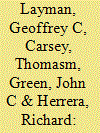

|
|
|
|
|
| Publication |
2010.
|
| Summary/Abstract |
Party activists have played a leading role in "conflict extension"-the polarization of the parties along multiple issue dimensions-in contemporary American politics. We argue that open nomination systems and the ambitious politicians competing within those systems encourage activists with extreme views on a variety of issue dimensions to become involved in party politics, thus motivating candidates to take noncentrist positions on a range of issues. Once that happens, continuing activists with strong partisan commitments bring their views into line with the new candidate agendas, thus extending the domain of interparty conflict. Using cross-sectional and panel surveys of national convention delegates, we find clear evidence for conflict extension among party activists, evidence tentatively suggesting a leading role for activists in partisan conflict extension more generally, and strong support for our argument about change among continuing activists. Issue conversion among activists has contributed substantially to conflict extension and party commitment has played a key role in motivating that conversion.
|
|
|
|
|
|
|
|
|
|
|
|
|
|
|
|
| 2 |
ID:
097016
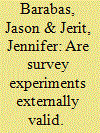

|
|
|
|
|
| Publication |
2010.
|
| Summary/Abstract |
Researchers use survey experiments to establish causal effects in descriptively representative samples, but concerns remain regarding the strength of the stimuli and the lack of realism in experimental settings. We explore these issues by comparing three national survey experiments on Medicare and immigration with contemporaneous natural experiments on the same topics. The survey experiments reveal that providing information increases political knowledge and alters attitudes. In contrast, two real-world government announcements had no discernable effects, except among people who were exposed to the same facts publicized in the mass media. Even among this exposed subsample, treatment effects were smaller and sometimes pointed in the opposite direction. Methodologically, our results suggest the need for caution when extrapolating from survey experiments. Substantively, we find that many citizens are able to recall factual information appearing in the news but may not adjust their beliefs and opinions in response to this information.
|
|
|
|
|
|
|
|
|
|
|
|
|
|
|
|
| 3 |
ID:
097024
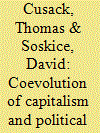

|
|
|
|
|
| Publication |
2010.
|
| Summary/Abstract |
Protocorporatist West European countries in which economic interests were collectively organized adopted PR in the first quarter of the twentieth century, whereas liberal countries in which economic interests were not collectively organized did not. Political parties, as Marcus Kreuzer points out, choose electoral systems. So how do economic interests translate into party political incentives to adopt electoral reform? We argue that parties in protocorporatist countries were "representative" of and closely linked to economic interests. As electoral competition in single member districts increased sharply up to World War I, great difficulties resulted for the representative parties whose leaders were seen as interest committed. They could not credibly compete for votes outside their interest without leadership changes or reductions in interest influence. Proportional representation offered an obvious solution, allowing parties to target their own voters and their organized interest to continue effective influence in the legislature. In each respect, the opposite was true of liberal countries. Data on party preferences strongly confirm this model. (Kreuzer's historical criticisms are largely incorrect, as shown in detail in the online supplementary Appendix.)
|
|
|
|
|
|
|
|
|
|
|
|
|
|
|
|
| 4 |
ID:
097022
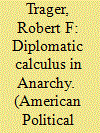

|
|
|
|
|
| Publication |
2010.
|
| Summary/Abstract |
When states come to believe that other states are hostile to their interests, they often reorient their foreign policies by realigning alliance commitments, building arms, striking first, mobilizing troops, or adopting policies to drain the resources of states that menace them. This article presents a crisis bargaining model that allows threatened states a wider array of responses than the choice to back down or not. Two implications are that (1) "cheap talk" diplomatic statements by adversaries can affect perceptions of intentions, and (2) war can occur because resolved states decline to communicate their intentions, even though they could, and even though doing so would avoid a war. The model relates the content and quality of diplomatic signals to the context of prior beliefs about intentions and strategic options. In simulations, this form of diplomatic communication reduces the likelihood of conflict.
|
|
|
|
|
|
|
|
|
|
|
|
|
|
|
|
| 5 |
ID:
097017


|
|
|
|
|
| Publication |
2010.
|
| Summary/Abstract |
This article presents an experiment in which 49 Indonesian villages were randomly assigned to choose development projects through either representative-based meetings or direct election-based plebiscites. Plebiscites resulted in dramatically higher satisfaction among villagers, increased knowledge about the project, greater perceived benefits, and higher reported willingness to contribute. Changing the political mechanism had much smaller effects on the actual projects selected, with some evidence that plebiscites resulted in projects chosen by women being located in poorer areas. The results suggest that direct participation in political decision making can substantially increase satisfaction and legitimacy.
|
|
|
|
|
|
|
|
|
|
|
|
|
|
|
|
| 6 |
ID:
097025
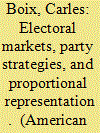

|
|
|
|
|
| Publication |
2010.
|
| Summary/Abstract |
Following Kreuzer's (2010) methodological pleas, I first reflect, at the conceptual level, on the ways in which historical research and political science should be related to each other. I then apply some of those considerations to examine two key "moments" in the theory (and history) of institutional choice that I first presented in Boix (1999): the underlying conditions that shaped the interests of different parties toward proportional representation, and the process through which those interests were translated into actual legislative decisions.
|
|
|
|
|
|
|
|
|
|
|
|
|
|
|
|
| 7 |
ID:
097018


|
|
|
|
|
| Publication |
2010.
|
| Summary/Abstract |
This article examines the electoral consequences of variation in voter turnout in the United States. Existing scholarship focuses on the claim that high turnout benefits Democrats, but evidence supporting this conjecture is variable and controversial. Previous work, however, does not account for endogeneity between turnout and electoral choice, and thus, causal claims are questionable. Using election day rainfall as an instrumental variable for voter turnout, we are able to estimate the effect of variation in turnout due to across-the-board changes in the utility of voting. We re-examine the Partisan Effects and Two-Effects Hypotheses, provide an empirical test of an Anti-Incumbent Hypothesis, and propose a Volatility Hypothesis, which posits that high turnout produces less predictable electoral outcomes. Using county-level data from the 1948-2000 presidential elections, we find support for each hypothesis. Failing to address the endogeneity problem would lead researchers to incorrectly reject all but the Anti-Incumbent Hypothesis. The effect of variation in turnout on electoral outcomes appears quite meaningful. Although election-specific factors other than turnout have the greatest influence on who wins an election, variation in turnout significantly affects vote shares at the county, national, and Electoral College levels.
|
|
|
|
|
|
|
|
|
|
|
|
|
|
|
|
| 8 |
ID:
097015


|
|
|
|
|
| Publication |
2010.
|
| Summary/Abstract |
Frederick Douglass's Freedmen's Monument speech of 1876 is notable for its complexity, and commentators have offered widely varying readings. Critics have judged it an abdication of racial responsibility, indicative of an unwarranted optimism characteristic of Douglass's larger argument on racial reform. In this article, I explicate this speech, highlighting the complex rhetorical design in which Douglass forges a memory of Lincoln as a medium for issuing carefully targeted appeals to the interests and virtues of black and white Americans. In its hitherto underappreciated theoretical dimension, the speech epitomizes a theory of racial progress that challenges recent, pessimistic readings of America's racial history and prospects.
|
|
|
|
|
|
|
|
|
|
|
|
|
|
|
|
| 9 |
ID:
097023
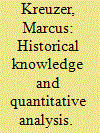

|
|
|
|
|
| Publication |
2010.
|
| Summary/Abstract |
Political scientists commonly draw on history but often do not read actual historians carefully. This limited engagement with historians, and with contextual information more generally, contributes to a loss of historical knowledge that can undermine the validity of quantitative analysis. This article makes this argument by means of an examination of the qualitative evidence underlying the important quantitative arguments about the origins of electoral systems advanced by Carles Boix and by Thomas Cusack, Torben Iversen, and David Soskice. The article explores how their respective attention to historical knowledge affects the quality of their data, the plausibility of their hypotheses, and, ultimately, the robustness of their statistical findings. It also analyzes how such knowledge sheds new light on the causal direction between institutions and their economic effects.
|
|
|
|
|
|
|
|
|
|
|
|
|
|
|
|
| 10 |
ID:
097020
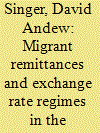

|
|
|
|
|
| Publication |
2010.
|
| Summary/Abstract |
This article argues that the international financial consequences of immigration exert a substantial influence on the choice of exchange rate regimes in the developing world. Over the past two decades, migrant remittances have emerged as a significant source of external finance for developing countries, often exceeding conventional sources of capital such as foreign direct investment and bank lending. Remittances are unlike nearly all other capital flows in that they are stable and move countercyclically relative to the recipient country's economy. As a result, they mitigate the costs of forgone domestic monetary policy autonomy and also serve as an international risk-sharing mechanism for developing countries. The observable implication of these arguments is that remittances increase the likelihood that policy makers adopt fixed exchange rates. An analysis of data on de facto exchange rate regimes and a newly available data set on remittances for up to 74 developing countries from 1982 to 2006 provides strong support for these arguments. The results are robust to instrumental variable analysis and the inclusion of multiple economic and political variables.
|
|
|
|
|
|
|
|
|
|
|
|
|
|
|
|
| 11 |
ID:
097019


|
|
|
|
|
| Publication |
2010.
|
| Summary/Abstract |
This article promotes a characterization of intraparty politics that explains how rank- and-file party members control the delegation of power to their cabinet ministers and shadow cabinet ministers. Using the uncovered set as a solution concept and a measure of party members' collective preferences, we explore the hypothesis that backbenchers' preferences constrain the ministerial selection process in a manner that mitigates agency problems. Specifically, promotion is distributed preferentially to members whose own policy preferences are proximate to the uncovered set of all party members' preferences. Our analysis of ministerial appointments in the contemporary British Parliament supports this view. For both the Labour and Conservative parties, front bench appointments are more sensitive to the collective preferences of backbenchers in each party as measured by the party uncovered set than to the preferences of the parties' leaders.
|
|
|
|
|
|
|
|
|
|
|
|
|
|
|
|
|
|
|
|
|